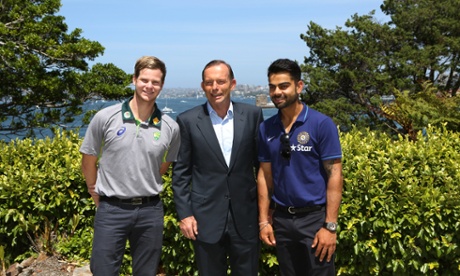To accept that sledging is OK on the cricket field, you must view sport as total war, rather than the workplace of professional athletes. No wonder Tony Abbott endorses it
Australian test captain Steve Smith (left) and Indian captain Virat Kohli (right) with Australian Prime Minister Tony Abbott during a reception for the Indian and Australian test cricket teams held at Kirribilli House in Sydney, 1 January 2015.Photograph: AAP
When it comes to sport, Australian politicians have always known the score. They know when to fling on a footy scarf for the cameras, and the value of a photo op with the hero of the moment.
Certainly, sportiness and fitness have always been a major component of Tony Abbott’s public image. Mock the “
budgie smugglers” all you want, but Abbott’s various
lycra-clad outings feed into a complex (and troubling) set of messages about strength, virility, and authority. And credit where it’s due: Abbott in person is genuinely physically imposing.
So it’s refreshing to hear Abbott admit his sporting prowess has its limits. At a New Year’s Day function at Kirribilli House for the Australian and Indian cricket teams, Abbott was
surprisingly candid about his days playing cricket at Oxford:
For a politician with a reputation for relentless negativity, this is a pretty stunning own goal (to mix sports metaphors). Confessing he had no substance as a cricketer but held his place on the team because he was good at abusing opponents doesn’t so much invite comparison with Abbott’s political persona as demand it at gunpoint.
Beyond the politics, though, there’s something disturbing about the casual acceptance, indeed endorsement, of sledging. Abbott wasn’t apologising, and neither it seems do most cricketers, except when they accept things have gone “too far.” Even Australia’s sledger-in-chief, David Warner, is now
calling for restraint.
And a year ago, Michael Clarke
insisted that while offering James Anderson a “broken fucking arm” crossed a line, “the Australian way is to play tough, non-compromising cricket on the field.” So long as you don’t cross the line (assuming we can agree roughly where to draw it), sledging is apparently a perfectly acceptable way for grown men to behave in public. Time and again, we’re told that it’s just part of the game, witty banter that does no real harm.
But being a part of something is not the same thing as being an integralpart of something. An integral part can’t be removed without the thing from which you remove it ceasing to be what it is. Is sledging integral to cricket? It’s hard to see how. The object of the game is to score the most runs and to prevent your opponent from doing the same. That, clearly, can be done without abuse.
You could reasonably reply that sport isn’t just a physical contest, but a psychological one as well, and players need to take every advantage the rules allow them to in order to win. So long as a “line” isn’t crossed, and everyone professes to “respect” their opponents off the field, what’s the problem?
I once
found myself in a Twitter argument about sledging with sports journalists Rohan Connolly and Richard Hinds. At one point,
Connolly tweeted: “If you expect a sporting contest to be conducted by the same standards as everyday society, stick to chess.”
Leave aside the fact even chess has its share of
unsporting behaviourand
cheating scandals. Connolly’s comment actually gets to the heart of the problem: we treat the sporting field as if it’s a space outside of our everyday ethical reality, where the usual rules don’t apply. Perhaps that’s why sledging apologists are so keen to stress their “respect” for their opponents and how civil everyone is once they get off the field: once we’re all back in the “real world”, you see, we’re all perfectly lovely, really.
Except the “real world” has no outside. The moral sphere has no exits. A point that was largely lost in the wake of Phillip Hughes’s tragic death is that Hughes was around the 150th Australian to
die in a workplace accident in 2014. We can think of the MCG or the Gabba as a sort of sacred ground, but it’s also, inescapably, a place where professional sportspeople do their jobs. Once we accept that, sledging starts to look very different. If it’s not OK to call your co-workers fat or make sexual comments about their partners at work, what makes it OK out on the SCG?
Top-level sport pulls players in two different directions: the usual ethical concern for others, perhaps embodied in virtues of “sportsmanship”, and the all-encompassing imperative to win. Love your neighbour, but hate your opponent – even though they’re the same person.
Consider the runner who stops to aid a fallen competitor, from
John Landy to Lightning McQueen. We rightly praise those who put ethical concern for the other ahead of the logic of competition in this way. Yet this praise involves a tacit assumption that such a gesture is what philosophers call
supererogatory: it goes above and beyond what can reasonably be demanded of you. You’re there to win, not to make friends, right?
The idea that sledging is “just a part of the game” is built around a fundamental misunderstanding of how ethics works: the idea that you can suspend most of ethics until the game’s over, so long as it helps you win. It’s OK to dehumanise your opponent if it makes it easier for you to crush them. It’s sport-as-total-war.
Perhaps it’s no surprise, then, that proponents of politics-as-total-war would find sledging comes so easily to them. But the floor of parliament is just as much part of the real world as the MCG. Ethics has no outside – not even in Canberra.









